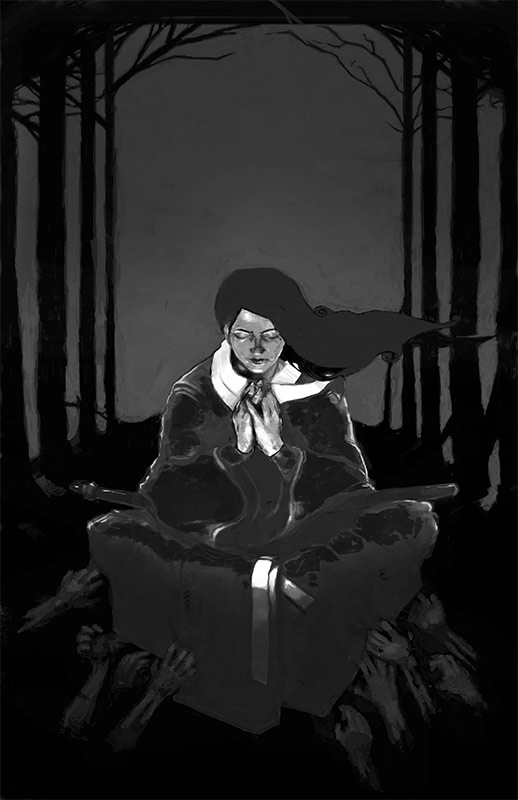In an article about the origins of the Eschaton Cycle, I mentioned one influence came in the form of a D&D campaign I ran around 2001. The themes of reincarnation and cyclical destruction resonated with me enough that, the essence of the game carried over into my later writings.
An article about games as a story-telling medium would be a whole other thing. For the moment, I want to talk about more direct influences upon my life and about the systems themselves.
My first experience with tabletop role-playing games (TTRPGs) came in the form of Middle Earth Roleplaying System (MERPS), something my dad brought home when I was a kid. It was a few years after we had read The Lord of the Rings, so I think I was probably eight or nine. We only played a few times. It did, however, leave an enduring impression and a fondness for the hobby.
I soon began developing my own TTRPGs (the sort of slip-shod creations you’d expect those in middle school years to manage), before getting exposed to other traditional games.
I played, ran, and created a lot of these games. I played lots of D&D (2nd ed, 3rd ed, 3.5, 4e, and 5e). I played a bit of World of Darkness (both editions). A bit more Warhammer Fantasy Roleplaying (2nd ed, I think). A great deal of Shadowrun (two editions). And more than anything else, a game I developed in various iterations (with more thematic ties to one another than anything else), called Echoes. The first and longest Echoes campaign ran for two years, covering a pretty damn epic story.
Only in the tail end of my RPG days did I discover indie RPGs, so I only toyed with them. Many I read, loved, and never had the chance to play. The Riddle of Steel I think we ran once or twice. The Burning Wheel we never even got to try, nor Zweihander, which looked truly cool.
I have a number of readers, especially one particular patron, who write to me about their own TTRPG experiences. Most focus on D&D, which, as the grandfather of the hobby, remains the most popular. D&D campaigns provided some of my favorite campaigns I ever played in, despite the fact I would call the D&D system (as a whole) my least favorite system of any I dealt with.
The 2e system had flavor but laughably back-half-asswards mechanics. Third edition tried to rectify this (maybe it did), but wound up becoming so “crunchy” (gamers know what I mean) it sometimes felt more like a strategy game than an RPG. Fourth ed went even further in this direction, basically becoming a board game. Fifth retreaded and I’d call it progress, though by the time it came out, I was already moving away from TTRPGs, so I only played a few games with it.
I had a family by then, and that, naturally, meant my priorities had shifted. I needed to focus most of my time into my business to support us, and what free time I had, I had to divided between spending with my family, and the hobbies most important to me (which wound up being reading and video games).
Nevertheless, I still find my brain sometimes drawn back to these things. I have this desire to create a system for the Eschaton Cycle, using everything I learned in creating Echoes (as an aside, I once intended to use my company to publish Echoes, but I abandoned the project because I feared the potential return wouldn’t justify the time investment).

One thing I keep thinking about, in these systems, is how progression works. Mentally, I’ve been segmenting these into rigid, flexible, and freeform progression systems.
D&D has a rigid system. You pick a class and follow a fixed progression in it. You might be able to switch classes or multi-class, but it’s not the norm. The class system (in most games) is designed to create a theoretical balance by ensuring different players develop varying, complimentary skills for their characters.
Warhammer Fantasy Roleplay (WFRP) has a flexible progression system. It has various career paths you follow for short durations, then shift from them as you complete them (or find opportunities or whatever). The career paths add structure to the progression, but it’s a much more loose one than D&D classes.
Games like Shadowrun or World of Darkness have largely freeform progressions. Most any character can theoretically train in any skill or ability at any time, though costs may vary based on certain factors. Shadowrun kinda sorta has classes, in that, following one path may make certain other paths impractical, but at no point are you asked to choose a class exactly. And whatever you build for your character, you can always, at any point, train in a skill like pistols or swords or computers or whatever.
Most of my system creation experiments ran in the lines of the flexible or freeform systems. Much as I loved the idea of the freeform one, it did frequently introduce balance issues in longterm campaigns. It leads to me wonder if something along the lines of WFRP’s progression system has the most potential for long-running campaigns.
Of course, I don’t actually have time to pursue these things, but they can be fun mental exercises.
